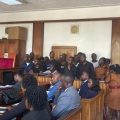DEFENDING LAND AND ENVIRONMENTAL RIGHTS
………Special Report; Abridged testimony……. Militarized land administration is promoting violence against poor landowners; an experience of one of the tortured defenders.
Published
4 years agoon

From extreme right, Bakaleke Joseph the former Kiryandongo Police commander together with other police officers during a visit on a contested land.
By witnessradio.org Team
A quiet and peaceful mood defines what used to be a busy community of smallholder farmers whose entire lifestyle depended on farming fields. During the rainy season, the entire family coupled with young, youths and the old would spend the entire time in the garden and they would return when it turns dark. Tea, lunch, and supper meals would be cooked and taken from there as a family targets to plant more acre of land using ordinary farm tools (hand-hoes) for a big harvest.
What used to be grazing fields for animals, gardens of cassava, sweet potatoes, maize, bananas, or burial grounds, among others, are now sugar plantation farms and some shrubs that have almost closed what used to be the feeder roads.
The village is called Kikungulu, Kitwara Sub-County, and 40 km deep in Kiryandongo district, which is bordered by Nwoya District to the north side, Oyam District to the northeast, Apac District to the eastern side, and Masindi District to the south and western side.
With almost all roads closed and the available ones being bushy, thorny, and impassable, it is easier for one to assume no families live in the village.
Deep down in the village is the home of Atyaluk David Richard a land rights defender trapped in the middle of a large sugarcane plantation owned by a multinational company, Kiryandongo sugar limited.
Kiryandongo Sugar Limited is one of the many companies owned by the Rai Group of Mauritius. The dynasty owns several other companies in DR Congo, Kenya and Malawi, and Uganda. They own companies such as West Kenya Sugar (which owns Kabras Sugar), Timsales Limited, Menengai Oil Refineries, RaiPly, and Webuye Panpaper.
In Uganda, the Rai Group of Mauritius owns Nile Ply limited, Kinyara Sugar Limited, and Masindi Sugar Limited among others.
Atyaluk’s problems stem from 2017 when he “refused” to surrender his land to the company. His actions attracted severe torment from the company and its agents to give way to large-scale sugarcane projects.
Then came a role of mobilizing and empowering his community to resist land grabs by the same multinational company. The latter brought real-life threats including torture and abductions that almost led to death. A selfless defender has faced more than 4 times of arbitrary arrests and torture for his work.
Before the violent eviction in 2017, Atyaluk and over 35000 villagers lived and cultivated peacefully on the land their parents and relatives occupied since the 1930s.
Out of his 50 acres of land he owned, Atyaluk now farms on less than an acre. The rest were forcefully grabbed by the sugar company at a gunpoint.
He is currently leading some families that have resisted surrendering their land also have withstood all the violent actions of the company being guarded by soldiers from the 4th Division of the Uganda People’s Defense Forces (UPDF).
UPDF is a national army whose constitutional obligations to the people living in Uganda is to; Article 209 (a) of the 1995 Constitution of the Republic of Uganda mentions four functions of UPDF namely;
(a) to preserve and defend the sovereignty and territorial integrity of Uganda;
(b) to cooperate with the civilian authority in emergency situations and in cases of natural disasters;
(c) to foster harmony and understanding between the defense forces and civilians; and
(d) to engage in productive activities for the development of Uganda.
However, the narrative that the force depicts is different. One of the most recent violent attacks on the defender was on 25 March 2020 when company workers, accompanied by four soldiers of the Uganda People’s Defense Forces (UPDF), entered his property with a tractor and plowed his maize fields. When he tried to stop the tractor from destroying his crops, the soldiers grabbed him, and was severely assaulted
According to Atyaluk, he was alerted by his neighbor that his maize farm was being destroyed, he rushed to talk to them but instead he was arbitrary arrested and taken to an unknown detention center and tortured.
He claims he was able to identify one of the soldiers as Captain Omoro, who was one of the commandants at the military detach where he was held incommunicado and tortured…” When they took me inside, Captain Omoro came and shouted at me, said they are trained to kill, that whoever disturbs them he/she will not like the repercussions, he vowed to torture me until I leave the land,” Said Atyaluk
Omoro’s statements were also reechoed by a 52-year-old and a mother of 11, Janet Akiru. She said similar threats and intimidatory statements led her and the family to painfully leaving their land as precaution measures.
According to Akiru, she relocated to her relatives in Bugiri District, the Eastern part of Uganda.
“When soldiers kidnapped Atyaluk, my husband abandoned me and my family. All our gardens got destroyed and houses demolished and I couldn’t take care of my family. These are the people who could come to our home, without explanation, beat up everyone. Because of fear of our dear lives, we had to abandon the invaluable heritage,” Said Akiru.
In a description of the Ndoi military detach where Atyaluk was illegally kept, the place is fenced with barbed wires and polls. It has many small houses and a slightly bigger house where villagers are illegally detained and tortured. According to Atyaluk, soldiers can only stop torturing upon seeing blood fussing from one’s body, which soldiers call a lesson to villagers that can be shared with others.
For Atyaluk, after being tortured, he was taken to Kiryandongo district Central Police Station, without any treatment and he was detained for seven days before being charged with criminal trespass and released on police bond.
According to Atyaluk’s medical reports from Kiryandongo hospital, the defender sustained severe injuries on one of his legs, libs, and back.
While on police bond, early this year, Atyaluk was attacked again, because he was constructing a house on his small piece of land left for him by the company.
He reports that with no explanations he was kidnapped from his home at around 8:00 am local time on 12th March 2021.
“We saw three armed soldiers in full army uniform coming to our home. As soon as they got into our compound, they announced that we’re taking him. We asked them who, they replied that Atyaluk. He was immediately arrested and ordered to sit down. A few minutes, later, Atyaluk was ordered to get up and walk. The soldiers walked with him up to Ndoi village, where he was ordered to enter into a car labeled with United Nations High Commissioner for Refugees (UNHCR) banners, car registration No. UAW 796Z” Said Olupot James, a brother to Atyaluk.
According to Olupot, upon Atyaluk’s abduction, he followed the car until it was seen entering a military detach at Kamusenene village where he was severely beaten and flogged by Uganda People Defense Forces soldiers.
“While in there I was badly beaten before police intervention. A police pick-up double cabin car registration number UP 7684 with 8 police officers commanded by the Kiryandongo district police commander, SP Odonga Tonny came and picked me from the military camp at 3:00 pm local time on the day of kidnap. I was later taken to the Kiryandongo Central Police Station,” Said Atyaluk.
Atyaluk, 41, and breadwinner of 8 children, was illegally detained at Kiryandongo for five (5) days before he was charged with setting fire to the crops and released on bond.
In this and countless other cases, soldiers resorted to arbitrary arrest, and torture as methods to intimidate those who amplify voices for the communities in resistance to violent land grabs.
What hurts the defender and other residents is that attempts to open up charges against the multinational company workers, guards, and individual security officers for their violent acts are curtailed.
“We are not accepted to register complaints of locals against the multinational companies, why, these are orders from above,” Said a police officer at Deyle police post who preferred anonymity.
However the Kiryandongo district police commander SP Odonga Tonny, said no actions of violence against the defenders and the project-affected persons have been reported.
“Some residents are arrested for being violent but have not been tortured. If there allegations of abductions and torture, I and my team will investigate the matter,” he added.
However, he denied allegations of providing security to Kiryandongo Sugar Limited and other multinationals to arbitrary arrest and harm defenders.
But the Kiryandongo sugar limited maintains it never evicted any person on the land and denies the allegations of torture, and arbitrary arrests against the locals in the area where they are operating. They rather claim that they worked with community leaders to develop a humanitarian compensation and resettlement plan for all of the illegal occupants.
Related posts:

 Violence escalation: land right defender is picked from his home on a gunpoint
Violence escalation: land right defender is picked from his home on a gunpoint
 …..Special Report; Abridged testimony….. Arbitrary arrested and detained for representing PAPs; an experience of the Witness Radio – Uganda lawyer
…..Special Report; Abridged testimony….. Arbitrary arrested and detained for representing PAPs; an experience of the Witness Radio – Uganda lawyer
 …….Special Report; abridged testimony……. ABDUCTION AND TORTURE: New methods used by multinationals and security agencies to grab land from the poor communities…
…….Special Report; abridged testimony……. ABDUCTION AND TORTURE: New methods used by multinationals and security agencies to grab land from the poor communities…
 ……Special Report abridged testimony…… How a pregnant woman was beaten by multinationals and local police over her land…
……Special Report abridged testimony…… How a pregnant woman was beaten by multinationals and local police over her land…
You may like
DEFENDING LAND AND ENVIRONMENTAL RIGHTS
Crackdown on EACOP protesters intensifies: 35 Activists arrested in just four months.
Published
2 months agoon
April 30, 2025
By Witness Radio team.
Ugandan authorities’ ongoing crackdown on anti-EACOP protest marches is spreading rapidly like wildfires. The East African Crude Oil Pipeline (EACOP) Project, a significant oil infrastructure development, has been a point of contention. Recently, Witness Radio warned that criminalizing the activities of individual activists and environmental defenders opposed to this project, which aims to transport crude oil from Hoima in Uganda to the Port of Tanga in Tanzania, will be regarded as the most disastrous and insensitive to communities’ concerns in Uganda’s history.
In just four months, a series of arrests targeting environmental activists opposing the mega oil project that transports crude oil from Hoima in Uganda to the Port of Tanga in Tanzania has resulted in a scene of crime. No one is allowed to express their concerns peacefully about it and push back on its adverse negative impacts.
While activists view the peaceful marches as a rightful and brave effort to protect the environment and the communities affected by the project, the authorities, including the Uganda police and Prosecutor’s office, regard these actions as attempts to sabotage development projects and resort to criminalization.
Activists and civil society organizations’ reports indicate that the project will likely damage the environment and has displaced thousands of local communities in Uganda and Tanzania.
Despite growing concerns and an intensified crackdown, project financiers and shareholders remain unwavering in supporting the EACOP project. This steadfast support underscores the urgency of the situation. However, environmental and human rights defenders stand firm, resolutely demanding the project’s halt, showing a glimmer of hope in this challenging situation.
Over last weekend, eleven (11) environmental activists were arrested, charged, and sent to prison. They were arrested and detained by police at Kenya Commercial Bank (KCB) premises while attempting to deliver a petition urging the bank to halt its financial support for the 1,444-kilometer heated pipeline project.
The arrest of the eleven activists comes less than a month after nine activists were detained on April 02 outside the Stanbic Bank headquarters while attempting to deliver a petition urging the bank to halt its funding for the project.
The eleven include Bob Barigye, Augustine Tukamashaba, Gilbert Ayebare, Umar Kasimbe, Joseph Ssengozi, Keith Namanya, Raymond Bituhanga, Mohammed Ssentongo, Paul Ssekate, Misach Saazi and Phionah Nalusiba.
KCB Bank Uganda is one of the banks that recently joined the race to fund the EACOP project. Last month, On March 26, 2025, EACOP Ltd., the company in charge of the construction and future operation of the EACOP project, announced that it had acquired additional financing provided by a syndicate of financial institutions, including regional banks such as KCB Bank.
Other banks in the syndicate include the Stanbic Bank Uganda, the African Export-Import Bank (Afreximbank), the Standard Bank of South Africa Limited, and the Islamic Corporation for the Development of the Private Sector (ICD).
The activists appeared before the Nakawa Chief Magistrate Court on April 25. They were charged with criminal trespass. According to section 302 of the Penal Code, a person convicted of criminal trespass is liable to a maximum sentence of one year in prison. This detail underscores the weight of the situation.
The activists are currently on remand at Luzira Maximum Prison and are expected to appear again before the court on May 08, 2025, for mention.
Related posts:

 The latest: Another group of anti-EACOP activists has been arrested for protesting Stanbic Bank’s financing of the EACOP Project.
The latest: Another group of anti-EACOP activists has been arrested for protesting Stanbic Bank’s financing of the EACOP Project.
 Another group of eleven environmental activists have been charged with common nuisance and remanded to Luzira Prison for opposing the EACOP project.
Another group of eleven environmental activists have been charged with common nuisance and remanded to Luzira Prison for opposing the EACOP project.
 Breaking: Eight (8) environmental activists have been arrested by police over protesting against the EACOP project.
Breaking: Eight (8) environmental activists have been arrested by police over protesting against the EACOP project.
 Breaking: 15 Anti-EACOP Activists Arrested in Kampala While Marching to Parliament
Breaking: 15 Anti-EACOP Activists Arrested in Kampala While Marching to Parliament
DEFENDING LAND AND ENVIRONMENTAL RIGHTS
Witness Radio Petitions ODPP urgently to review and withdraw criminal charges against Buvuma Community Land Defenders.
Published
3 months agoon
April 14, 2025
By Witness Radio team.
As Ugandan courts increasingly become tools of oppression, Witness Radio is deeply concerned about the growing trend of weaponizing the justice systems against communities, land, and environmental defenders who resist land grabbing and other harmful land-based investments.
In a well-calculated tactic, land grabbers and investors continue to collude with security agencies, particularly the police, to arrest violently and courts of law to maliciously prosecute hundreds of these defenders for either fighting back against the land-grabbing schemes or criticizing harmful land-based investments in Uganda.
This trend of persecution is not isolated to Buvuma but is a continuous threat in many other parts of Uganda. Buvuma, in particular, is a hotbed of injustice, where the government of Uganda, in collaboration with BIDCO, is implementing the National Oil Palm Project (NOPP) to expand palm oil growing in Uganda.
In our article dated March 5th this year, Witness Radio revealed how community land defenders in Buvuma continued to face judicial harassment on trumped charges simply for defending their land from being grabbed for palm oil plantations.
The accused defenders are residents of the Magyo and Bukula villages in the Buvuma district.
More than a dozen smallholder farmers in these villages situated in Nairambi Sub-county are facing violent evictions from their land and unending persecution. They have been framed with criminal charges for refusing to give away their land for palm oil growing.
The victims are legal owners of bibanja duly registered by Buganda Land Board and recognized as tenants by Buganda Land Board.
Buvuma College school is claiming ownership of the land, while Buvuma district officials, under the guise of protecting Kirigye Forest Reserve, also claim the same land on which these individuals have settled lawfully for decades.
Several community members have been arrested and charged with false criminal offenses.
Among them include community land rights defender Ssentongo, who is currently battling with cases CRB:301/2023, accused of illegally occupying Kirigye forest land (offense of carrying out prohibited activities in forest reserve).
CRB 232/2024 with complainant Kabale Denis (District Forest Officer) charged with carrying out prohibited activities in the forest reserve and CRB 098/2023 on criminal trespass with Buvuma College administration, the complainant.
Others facing persecution are Steven Kyeswa, Kisekwa Richard, and Kibondwe Chrysostom on CRB 141/2024 with assault occasioning actual bodily harm vide Criminal Case No 075 of 2024, among other cases.
As part of efforts to end the ongoing oppression of community defenders in Buvuma, Witness Radio has petitioned the Office of the Director of Public Prosecutions to urgently intervene, review, and withdraw the charges unjustly brought against these defenders.
According to the petition dated March 7th, 2025, the sole intention of these charges is to grab community land without any merits as criminal charges. Sarah Adong, one of the staff attorneys and Head of Witness Radio Legal Aid, reveals that the matters against the accused persons before the court point to the question of land ownership, which can only be answered through civil suits and not criminal charges. It is an apparent injustice.
“Upon thoroughly examining the facts, evidence, and circumstances surrounding these charges, it is evident that they have no merit whatsoever. They amount to vexatious and frivolous prosecution that serves no genuine interest of justice,” the petition by the Land and Environmental Rights Watchdog mentioned.
In an unusual turn of events, the Witness Radio Legal Aid team observed that some of the defenders, including Sentongo, have been charged with criminal trespass twice by the same complainant vide CC No 325 of 2020 and are now facing the same charge by the same party vide CC No 062/2023. This repeated persecution is a heavy burden on these defenders.
“The charges against our client undermine the accused person’s rights under Article 29 (9) of the Constitution of the Republic of Uganda. It has proven that the cases brought against our clients are frivolous and vexatious as they are instituted in a manner that constitutes abuse of court processes,” the petition further read.
Therefore, the organization strongly urges the office of the DPP to exercise its prosecutorial discretion under relevant legal provisions. This is crucial for the prevalence of equity, justice, and good conscience and reaffirming the prosecution process’s integrity and objectivity.
Related posts:

 Witness Radio petitions chief prosecutor: Want 34 community land rights defenders and activists released from prison.
Witness Radio petitions chief prosecutor: Want 34 community land rights defenders and activists released from prison.
 Palm Oil project investor in Landgrab: Witness Radio petitions Buganda Land Board to save its tenants from being forcefully displaced palm oil plantation.
Palm Oil project investor in Landgrab: Witness Radio petitions Buganda Land Board to save its tenants from being forcefully displaced palm oil plantation.
 Court charges and remands two community land rights defenders and eight farmers to prison
Court charges and remands two community land rights defenders and eight farmers to prison
 Uganda: Targeting community land and environmental defenders with criminal offenses is rising as two community land rights defenders arrested in a hotspot district of forced land evictions.
Uganda: Targeting community land and environmental defenders with criminal offenses is rising as two community land rights defenders arrested in a hotspot district of forced land evictions.
DEFENDING LAND AND ENVIRONMENTAL RIGHTS
Milestone: Another case against the EACOP activists is dismissed due to the want of prosecution.
Published
3 months agoon
April 8, 2025
By Witness Radio team.
The Buganda Road Chief Magistrate has dismissed another case against 20 anti-EACOP activists due to want of prosecution.
Yesterday, on April 7, 2024, her worship, Jalia Basajjabalaba, dismissed the case against the 20 activists. The case was dismissed after the state failed to produce witnesses pinning the activists on a common nuisance charge after close to 9 months of case trial.
On August 26, 2024, the 20 activists, including Pitua Robert, Okwai Stephen, Kothurach Margret, Omirambe Moses, Owonda Rogers, Alimange Joseph, and Wabiyona Wicklyf, among others, were arrested while peacefully marching to the Ministry of Energy to deliver a petition opposing EACOP and other oil projects. On August 27, 2024, they were arraigned before Court and charged by the Buganda Road Magistrate with common nuisance.
After nearly nine months of trial, the state failed to present a single witness, prompting the magistrate to close the case file.
Although the case against the activists has been dismissed, they remain deeply dissatisfied with the continued pattern of arrests and charges, which often collapse in Court due to a lack of evidence.
Bob Barigye, one of the activists whose case was dismissed, expressed concern over what he described as deliberate attempts to frustrate and silence voices critical of the EACOP project.
“We are saddened that it was just dismissed after eight months of pacing up and down to Court.
We are disappointed that the magistrate did not award us any cost or compensation for the dismissed case, meaning that the state failed to prove that we were a public nuisance and that we were citing violence as activists. Many of us have been forced to travel long distances from our villages to attend court sessions in Kampala — only for the state to produce no evidence against us. It’s a clear waste of our time, energy, and resources. But beyond that, it’s an attempt to discourage us from speaking the truth about the dangers of the EACOP project,” Barigye said.
Barigye added that the activists are already engaging their lawyers to explore further legal remedies in higher courts, demonstrating their unwavering commitment to justice and their cause.
“It is frustrating and deeply disappointing that we are dragged to Court and disrespected every time we stand up against this deadly pipeline, the East African Crude Oil Pipeline (EACOP). But we were ready to face this battle in Court because we knew we had committed no crime by delivering a petition,” Barigye said, expressing the activists’ exasperation with the legal process.
Shortly after their last Court appearance on February 20, the 20 accused activists, during a press briefing, demanded that the judiciary stop delaying hearings of their case related to the EACOP project and called for the dismissal of their case if the Court lacks sufficient evidence to prosecute them.
“The courts of law should not be used as tools of oppression. They should not waste any time. If we have a case to answer, let them prosecute us on April 7, which they have scheduled. If they fail again, they should dismiss the case instead of wasting our time and resources,” the activists emphasized, reiterating their demand for a fair and expedited legal process.
This is the second milestone achieved by the Stop EACOP activists in less than two months in their continued campaign against the EACOP pipeline. In February 2025, the Court also dismissed a common nuisance case against the 15 EACOP activists due to the lack of prosecution.
“The state doesn’t present a single witness in all the cases that have always been preferred against us. No witnesses have come along to say that these people were unruly. As activists, we want to investigate this further and go to the Constitutional Court to learn what constitutes a nuisance. Whoever is demonstrating peacefully is arrested and charged with a public nuisance. This charge is coronial and very demeaning. We want to go ahead and challenge this,” Barigye revealed, outlining the activists’ proactive plans to challenge the charge of public nuisance.
The EACOP project has long been controversial, with environmental activists arguing that it poses a significant environmental risk and has already left a trail of human rights abuses in the communities hosting it in Uganda and Tanzania.
The EACOP is a 1,443-kilometer heated pipeline transporting crude oil from Hoima, Uganda, to Tanga, Tanzania. The first 296 kilometers run through Uganda, while the remaining 1,147 kilometers pass through Tanzania. The project is a joint venture between TotalEnergies, the Uganda National Oil Company (UNOC), the Tanzania Petroleum Development Corporation (TPDC), and the China National Offshore Oil Corporation (CNOOC).
Related posts:

 Another group of eleven environmental activists have been charged with common nuisance and remanded to Luzira Prison for opposing the EACOP project.
Another group of eleven environmental activists have been charged with common nuisance and remanded to Luzira Prison for opposing the EACOP project.
 Breaking: The Bail Application for the 15 EACOP Activists flops for the second time, as the trial magistrate is reported to have been transferred.
Breaking: The Bail Application for the 15 EACOP Activists flops for the second time, as the trial magistrate is reported to have been transferred.
 Breaking: Buganda Road Court grants bail to 15 stop EACOP activists after 30 days in prison.
Breaking: Buganda Road Court grants bail to 15 stop EACOP activists after 30 days in prison.
 EACJ’s Appellate Court will hear an appeal on the dismissed Case against EACOP development.
EACJ’s Appellate Court will hear an appeal on the dismissed Case against EACOP development.

Communities Under Siege: New Report Reveals World Bank Failures in Safeguard Compliance and Human Rights Oversight in Tanzania

A decade of displacement: How Uganda’s Oil refinery victims are dying before realizing justice as EACOP secures financial backing to further significant environmental harm.

Carbon Markets Are Not the Solution: The Failed Relaunch of Emission Trading and the Clean Development Mechanism

Govt launches Central Account for Busuulu to protect tenants from evictions

Uganda’s top Lands Ministry official has been arrested and charged with Corruption and Abuse of Office, a significant event that will have far-reaching implications for land governance in the country.

A decade of displacement: How Uganda’s Oil refinery victims are dying before realizing justice as EACOP secures financial backing to further significant environmental harm.

Govt launches Central Account for Busuulu to protect tenants from evictions

Despite harsh repression, opposition to the EACOP pipeline in Uganda remains strong

Innovative Finance from Canada projects positive impact on local communities.
Over 5000 Indigenous Communities evicted in Kiryandongo District
Petition To Land Inquiry Commission Over Human Rights In Kiryandongo District
Invisible victims of Uganda Land Grabs
Resource Center
- LAND GRABS AT GUNPOINT REPORT IN KIRYANDONGO DISTRICT
- RESEARCH BRIEF -TOURISM POTENTIAL OF GREATER MASAKA -MARCH 2025
- The Mouila Declaration of the Informal Alliance against the Expansion of Industrial Monocultures
- FORCED LAND EVICTIONS IN UGANDA TRENDS RIGHTS OF DEFENDERS IMPACT AND CALL FOR ACTION
- 12 KEY DEMANDS FROM CSOS TO WORLD LEADERS AT THE OPENING OF COP16 IN SAUDI ARABIA
- PRESENDIANTIAL DIRECTIVE BANNING ALL LAND EVICTIONS IN UGANDA
- FROM LAND GRABBERS TO CARBON COWBOYS A NEW SCRAMBLE FOR COMMUNITY LANDS TAKES OFF
- African Faith Leaders Demand Reparations From The Gates Foundation.
Legal Framework
READ BY CATEGORY
Newsletter
Trending
-

 MEDIA FOR CHANGE NETWORK2 weeks ago
MEDIA FOR CHANGE NETWORK2 weeks agoA decade of displacement: How Uganda’s Oil refinery victims are dying before realizing justice as EACOP secures financial backing to further significant environmental harm.
-

 MEDIA FOR CHANGE NETWORK2 weeks ago
MEDIA FOR CHANGE NETWORK2 weeks agoGovt launches Central Account for Busuulu to protect tenants from evictions
-

 NGO WORK4 days ago
NGO WORK4 days agoCommunities Under Siege: New Report Reveals World Bank Failures in Safeguard Compliance and Human Rights Oversight in Tanzania
-

 MEDIA FOR CHANGE NETWORK2 weeks ago
MEDIA FOR CHANGE NETWORK2 weeks agoCarbon Markets Are Not the Solution: The Failed Relaunch of Emission Trading and the Clean Development Mechanism
